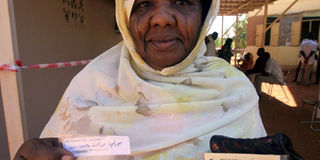Sudan delays elections by six days

A woman displays her identity card after registering for Sudan's first presidential and legislative elections in Khartoum, November 1, 2009. REUTERS
KHARTOUM, Monday (Reuters) - Sudan on Sunday announced a six-day delay to long-awaited elections to make up for hold-ups in registering millions of voters in the oil-producing country.
Election officials have faced huge logistical challenges in rolling out the first multi-party polls in 24 years in Sudan, Africa's largest country.
Sudan's National Elections Commission said it was extending voter registration across the country by seven days to December 7 because of a late start in some areas and appeals for an extension from some political parties.
As a result, the start of the ballot would be pushed to April 11, 2010 from April 5, said a statement from the Commission on state news agency Suna.
The elections -- parliamentary, presidential and local -- have been delayed twice before from their original date of July this year, set under the terms of a 2005 peace deal that ended more than two decades of civil war between north and south Sudan.
The timing of the poll has been a sensitive issue as any significant delay would push the vote into the start of the rainy season in May when large parts of Sudan are inaccessible.
Some southerners fear a long delay could encroach on a referendum on southern independence promised in January 2011 under the same peace accord.
North Sudan's dominant National Congress Party (NCP) on Sunday said it supported the latest small delay, which would give voters more time to sign up.
"We are afraid that a large extension of the elections will take us to the rainy season. But six days will not do that ... Most of the parties have asked for an extension. This is not going to be controversial," senior NCP official Ibrahim Ghandour told Reuters.
No one was immediately available to comment from the Sudan People's Liberation Movement (SPLM), the dominant party in the south.
The SPLM and opposition parties have previously said they would boycott the elections if a package of democratic laws they see as necessary for the vote was not drafted and passed by November 30.
Delays in implementing the 2005 north-south peace deal have raised tensions with less than five months until the elections.




